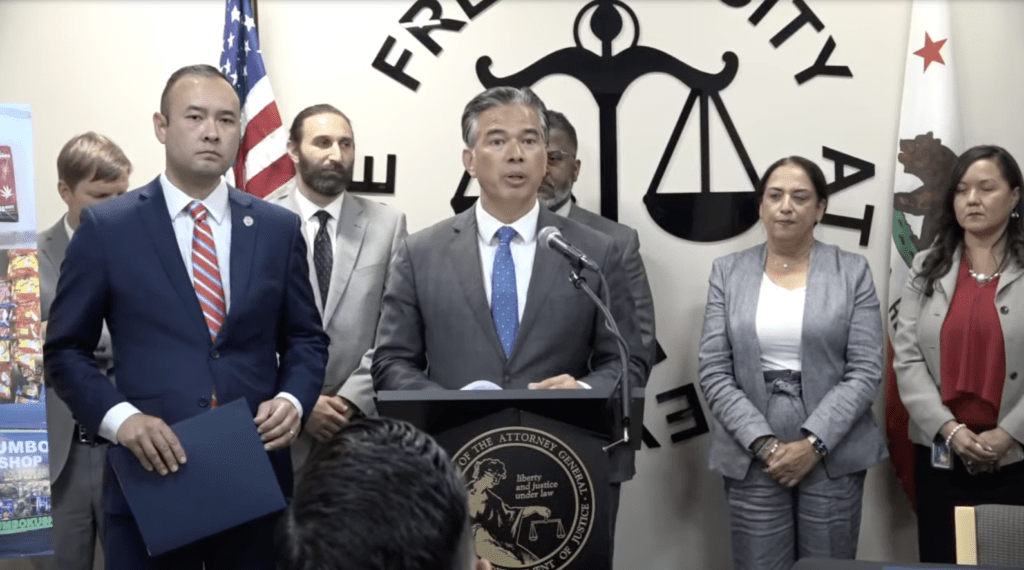
Attorney General Rob Bonta traveled to Fresno to announce the DOJ’s new Cannabis Administrative Prosecutor Program (CAPP) today. The program provides California cities and counties who partner with DOJ legal support to address illegal cannabis activity through administrative enforcement and nuisance abatement.
Unlicensed operations will be given the opportunity to voluntarily shut down before more enforcement in the form of code violation enforcement will take place, Bonta said at a press conference announcing the program. He spoke of the “complex and multifaceted” issue of ongoing illicit cannabis operations in the wake of state legalization. Instead of “perpetuating harms from the failed war on drugs” the aim of the program is to make illicit operations “less desirable.”
“When public safety is at risk we take appropriately aggressive action,” Bonta said. “But low-level offenders that don’t need to be treated as criminals, when we can shut down their operations through the administrative process, we will. And this will ensure that we can uplift and support the licensed cannabis industry.”
Starting in Fresno and expanding across the state, CAPP is “a new layer on a foundation of work” the DOJ has been doing, said Bonta, who noted that the EPIC will work closely with CAPP. He mentioned his support for the pending bill AB 1684, which expands local governments’ ability to immediately fine for cannabis cultivation to other cannabis activities, to “make more robust this administrative pathway.”
Fresno City Attorney Andrew Janz said at the press conference that the program would support the legal cannabis market and help grow the city’s tax base, without requiring additional local funding. “To those who continue to operate smoke shops, hookah lounges and tobacco stores targeting our children: We will hit you where it hurts, in the pocketbook. You will be fined, you will lose your property, and you will lose your opportunity to operate in the city of Fresno,” he warned. Code enforcement will be working closely with the DOJ towards this end, he said, noting that as fines ramp up they would be putting liens on businesses’ property.
A signing ceremony of an MOU between DOJ and Fresno followed. Photos were shown of copycat products from the illicit market that mimic candy or snacks appealing to children.
“The barriers to entry [the licensed cannabis market] are too high,” Bonta said in answer to a question following the signing. “The costs to stay in operation are too high. We should be lowering taxes at least temporarily for our cannabis businesses, and we should make the regulatory burden less than it is while we target the illicit base that is undercutting them. It’s a complicated and multifaceted situation.” While in the legislature, Bonta sponsored bills to regulate the cannabis industry, lower taxes on cannabis, and advance employment rights for marijuana users. His bill to automatically expunge past cannabis crimes got a boost from a “clean up” bill from his wife and successor Mia Bonta, along with the efforts of DOJ.
Many shootings and murders, including the son of a Fresno city council member, have traced back to hookah lounges that “target children,” Janz said, adding that the program started in Fresno in part because “we have a very well written local ordinance that allows us to do this” Not all cities have a robust code, said Bonta, adding, “Everyone can do it, they just need to have the political will and vote of the body.” He mentioned again AB 1684 as being helpful towards fostering local and state cooperation.
“I hope we start tomorrow. We’re ready to go,” said Janz. Bonta said he expected immediate results from the program, as fast as 21 days. He answered a question about his suit against the Chino Valley school district for “outing” a transgendered student, and in answer to another question, said he was “officially seriously considering” running for Governor, but is currently focused on the work of the AG’s office on issues like human trafficking, fentanyl, gun violence, organized retail crime, reproductive freedom, etc.
Two other state task forces and a federal one target illicit cannabis cultivation in California. Cal NORML was able to get protections in AB 1684 to protect personal cannabis gardens, medical gardens, and five-patient caregiver gardens permitted in H&SC 11362.5 (the Compassionate Use Act) and B&PC 26033, along with other protections.
Leslie Eller, director Central Valley NORML, asks, “Why isn’t Fresno allowing the 21 licensed cannabis shops that have been approved by the city to open? We only have two operating dispensaries here. The others are paying rent waiting for their chance to open, while the city puts up more barriers to opening. If we don’t want illicit operations, we have to make the legal ones viable, and lower the costs of cannabis to patients and others.”
